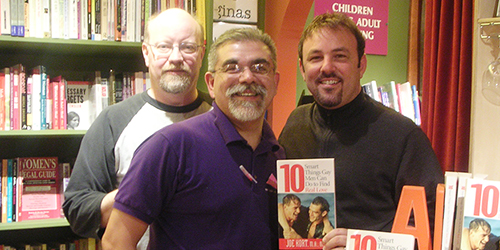By Keith Orr

Years ago, as a younger gay man, I remember walking by Common Language Bookstore. At the time it was a new store, owned and operated by two women, Kate and Kelly. I saw a book in the window, "Dancing on Tisha B'av", by a newly published author, Lev Raphael. I was drawn to the cover because the designer of the book had successfully created an intriguing and even alluring cover. I made several visits to the store before I finally bought the book. I had been unconvinced that I would relate to the book, as it was clearly about the Jewish gay experience, and even more specifically the perspective of a child of holocaust survivors.
I read the book and fell in love with the stories and the storytelling. I realized the reason to read the book was because, as with all great storytellers, the themes of the stories are universal. By reading Lev's words, I enriched my own world.
Stories are how cultures grow and flourish. We learn from stories told by our parents. Religions are shaped by the stories they tell.
As gay men and women, our stories form our culture. Many historians dispute the notion that Stonewall was the beginning of the gay civil rights movement, pointing to the courageous work of men and women like Del Martin and Frank Kameny. Though those pioneers set the stage for the gay movement, it was the story of Stonewall which gave rise to a popular civil rights movement. Against the backdrop of the funeral of Judy Garland, drag queens, the lowest caste of gay society in New York at the time, fought back against the oppression of the NYPD. Thousands joined them in their struggle, and held the police at bay for three days. That is a worthy creation story for a civil rights movement.
Through our history of civil rights, response to the AIDS crisis, bullying by the religious right, and victories in the courts and ballot box, it is our culture which gives us the compass to move forward. In Christopher Bram's book "Eminent Outlaws" he even argues that the group of post-World War II gay and lesbian authors shaped American culture, not just LGBT culture.
Lesbian, gay, transgender, and bisexual authors give shape and meaning to our experience. When "Rubyfruit Jungle" by Rita Mae Brown or "Stone Butch Blues" by Leslie Feinberg were first published they were trangressive. Though much has changed in the LGBT world in the intervening years, they remain fresh and inspirational. I love putting "Rubyfruit Jungle" into the hands of a young queer who has never heard of the book, and seeing that same young queer a few days later excited by the brilliant storytelling.
I believe we need to nurture our culture. As a culture withers and dies, so does its society. For many years the LGBT bookstore served the community: as a de facto community center, a safe space for our community, a political organizing point, a fundraising center for our organizations, and more. For all of that, I believe one of the most important functions was as a place for authors to find their audience.
Author events at Common Language bring together author, bookstore, reader, and even publisher. The publishing world is in turmoil. LGBT bookstores, which used to number in the hundreds are now down to about a dozen nationwide. And yet authors are still writing and readers are still looking for the next good book. LGBT bookstores, no matter how they evolve, must continue to be a vital part of that equation. Amazon.com doesn't really care what you read, as long as you buy it from them. LGBT bookstores exist in order to help authors and audiences find each other. In an era when even some libraries are forced to bow to political pressure and censor what material is available, independent LGBT bookstores remain a vital part of our culture.
We are painfully aware that we do not live in a post-gay world. This is especially true in Michigan. We do have many outstanding LGBT writers in the state. Whether you celebrate the stories of Laurie Salzler, Kage Alan, Jackie Nacht, Lev Raphael, or the many others featured in this issue, all of them have in common the experience of the richness and diversity of our LGBT culture. We need them as much as they need us.










